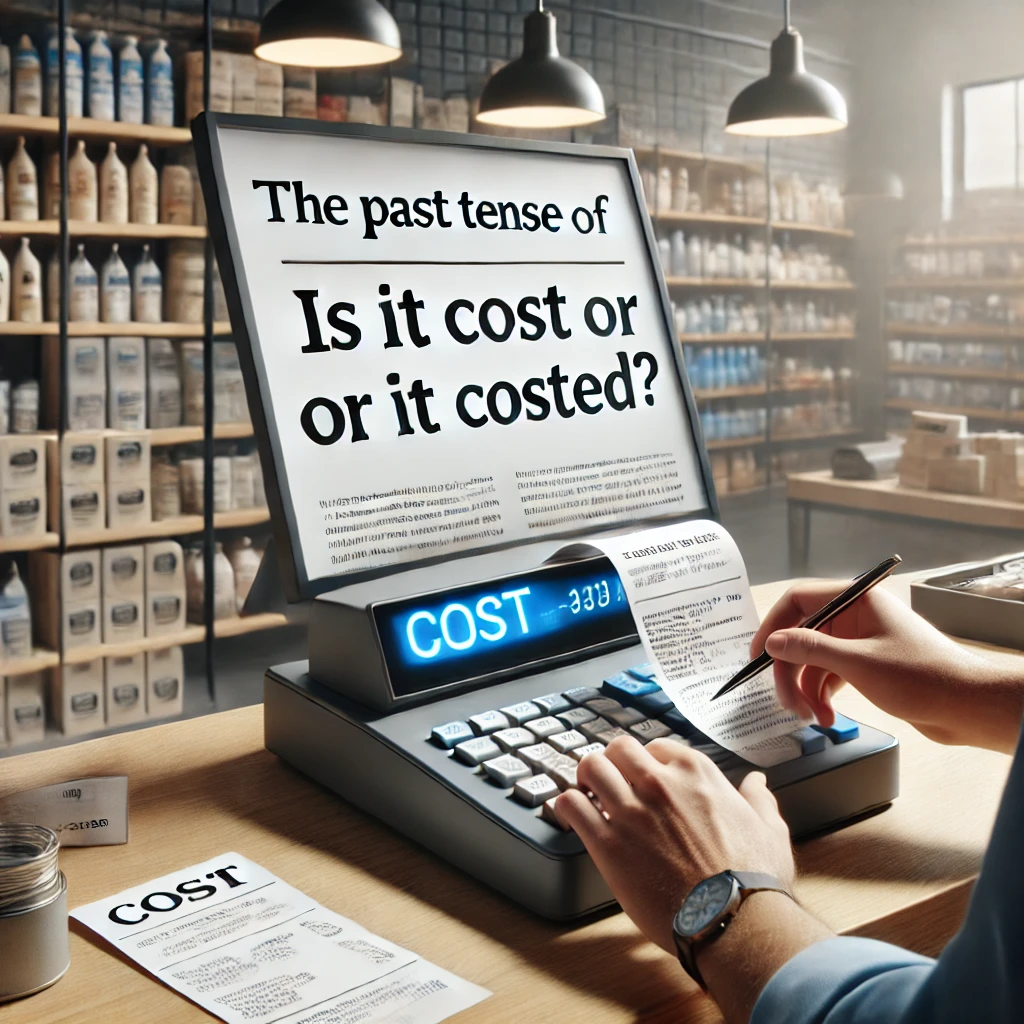Introduction
English grammar is full of surprises, especially when it comes to irregular verbs. One of the most debated questions in English usage is whether the past tense of cost is “cost” or “costed”.
Understanding when to use each form is crucial for accurate communication, particularly in professional contexts like business scenarios, financial analysis, and technical settings. While “cost” is the past form in most cases, “costed” has specific technical or professional applications.
In this guide, we’ll break down the differences, explain their correct usage, and provide clear examples.
Understanding the Past Tense of Cost
The verb “cost” is irregular, which means it does not follow the standard past tense rule of adding “-ed.” Instead, it remains the same in the past tense.
Standard Usage of “Cost” in Past Tense
- “That watch cost me $500.”
- “The project cost more than we expected.”
- “Last year, the repairs cost thousands of dollars.”
In all of these sentences, “cost” remains unchanged regardless of the tense.
However, “costed” does exist in English but is used in specific cases.
Read More About This Article: Forward vs. Forwards: Which One to Use?
When to Use “Costed” Instead of “Cost”
Unlike the general past form, “costed” appears in deliberate action cases, particularly in project estimation or financial analysis contexts.
“Costed” in Professional Contexts
- Used when referring to calculations, projections, or financial implications.
- Seen in technical or professional language, particularly in business context reports.
- Found in industries like budget forecasting, project costing, and cost analysis.
Examples:
✅ “The accountant costed the materials for the construction project.” ✅ “The financial team costed the entire event before getting approval.” ✅ “We have costed all potential expenses for the new product launch.”
In these sentences, “costed” refers to analyzing costs in a planned decision process, making it different from the standard “cost.”
Cost vs. Costed in Everyday Conversation
In everyday conversation, “costed” is rarely used. People naturally say “cost” even when referring to the past.
Examples of Common Dialogue:
🚫 “That meal costed too much!” ❌ ✅ “That meal cost too much!” ✔
🚫 “The new phone costed $1,000.” ❌ ✅ “The new phone cost $1,000.” ✔
Using “costed” in daily talk sounds unnatural unless discussing financial analysis or project estimation.
Grammar Rules and Sentence Examples
To clarify further, here’s a table comparing usage:
| Verb Form | Present Tense | Past Tense | Past Participle |
|---|---|---|---|
| Cost (irregular use) | The car costs a lot. | The car cost a lot. | The car has cost a lot. |
| Costed (technical use) | The accountant costs materials. | The accountant costed materials. | The accountant has costed materials. |
When discussing actual expenses, stick with “cost.” When discussing intentional effort to analyze expenses, “costed” is correct.
Cost and Costed in Financial & Professional Contexts
In financial analysis and budget study, “costed” is the preferred term.
Example Scenarios in Workplace Use:
- Budget forecasting: “We costed various scenarios before finalizing the investment plan.”
- Project estimation: “The engineering team costed the raw materials before beginning construction.”
- Financial implications: “The total production cost has been costed accurately.”
Common Synonyms for Cost
If you’re unsure whether to use “cost” or “costed,” consider using a synonym for cost to avoid confusion.
| Category | Synonym for Cost |
|---|---|
| General use | Price, expense, fee |
| Business | Valuation, expenditure, financial outlay |
| Accounting | Depreciation, outgoings, disbursement |
Each term fits different business scenarios and financial discussions.
How British and American English Influence Usage
Language evolves differently across regions. While American English strictly favors “cost” in all cases, British English has a slight tendency to use “costed” in more technical settings.
However, in both versions, “cost” remains the dominant form in common dialogue and casual speech.
Guidelines for Writers: Proper Language Use
To ensure proper language use, follow these guidelines:
When to Use “Cost”
✅ General past tense for expenses and prices.
✅ When referring to something that happened naturally or without a deliberate action.
✅ Any informal or conversational writing.
When to Use “Costed”
✅ In technical or professional discussions.
✅ When referring to budget forecasting, project estimation, or financial calculations.
✅ In reports, business plans, or professional documentation.
Final Tip: If you’re unsure, “cost” is usually the safest option in most contexts!
Conclusion
So, what’s the correct past tense of cost? The answer depends on the context.
- For regular past-tense usage, “cost” is correct.
- For deliberate action in financial or technical settings, “costed” is appropriate.
- In everyday conversation, always use “cost” to sound natural.
By understanding the correct spelling, grammar rules, and professional contexts, you can ensure your writing remains clear and grammatically accurate.
This guide should help eliminate confusion and make your writing resource more effective. Keep this grammar palette in mind when analyzing costs and making informed language choices!
